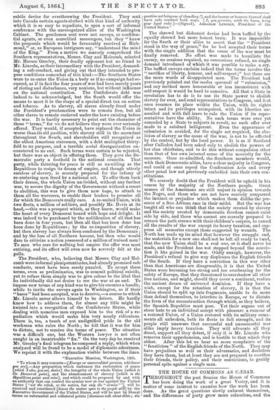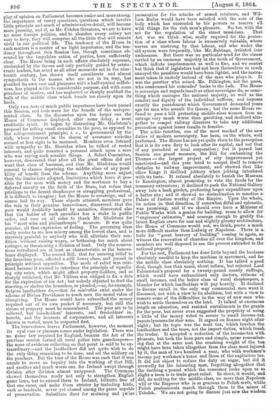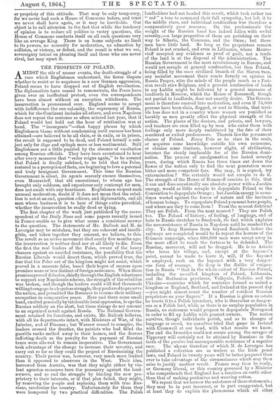THE HOUSE OF COMMONS AS C.ZESAR.
T OUGHOUT the past Session the House of Commons rTa's been doing the work of a great Vestry, and it is matter of some interest to examine how the work has been done. As the great questions slowly exhaust themselves, and the differences of party grow more colourless,-and the
play of opinion on Parliament becomes easier and morestrong, the importance of vestry questions, questions which involve little principle and much of administrative detail, will become more pressing, and if, as Mr. Cobden threatens, we are to have no more foreign politics, and to abandon every colony not easy to keep, they will comprise all the little that will remain vivid in our political life. The tendency of the House in such matters is a matter of no light importance, and the ten- dency throughout this Session has, though sometimes ob- scured by the impulsive action of parties, been sufficiently clear. The House being in such affairs absolutely supreme, unchecked by the throne and only partially guided by aristo- cratic leaders, has acted as all other monarchs act in the nine- teenth century, has shown itself considerate and almost sympathetic to the masses who are not in its way, has guarded its own ease and pleasures with a half-cynical selfish- ness, has played relile to considerable purpose, and with some grandeur of motive, and has neglected or sharply snubbed the bulk of the middle class which treads too closely upon its heels.
Only two Acts of much public importance have been passed this Session, and both were for the benefit of the unrepre- sented class. In the discussion upon the larger one the House of Commons displayed, after some delay, a most creditable spirit. It began by distrusting Mr. Gladstone's proposal for selling small annuities to the poor, as opposed to the self-government principle, i. e., to government by the rich, whose interest in the shares of assurance societies seemed at first sight to be menaced. Members even listened with sympathy to Mr. Sheridan when he talked of vested interests, and quite resented a personal attack upon a man who was saying such sensible things. A Select Committee, however, discovered that after all the great offices did not want that class of business, and that Mr. Gladstone would consent to clauses depriving the middle class of any possi- bility of benefit from the scheme. Anything more unjust than the limitations adopted, limitations which leave it pos- sible for the man with money and the workman to buy a deferred annuity on the faith of the State, but refuse that privilege to the decent shopkeeper or struggling professional, it is difficult to imagine ; but the House is sovereign, and of course had its way. Those objects attained, members gave the rein to their genuine benevolence, discovered that the poor would decidedly benefit by annuities, discovered also that the holder of such annuities has a stake in public order, and rose on all sides to thank Mr. Gladstone for his "most wise and philanthropic" measure. It was quite genuine, all that expression of feeling. The governing class really wishes to see less misery among the lowest class, and is sincerely grateful to anybody who will alleviate their con- dition without raising wages, or bothering too much about cottages, or threatening a division of land. Only the reserva- tions introduced are at least as characteristic as the benevo- lence displayed. The second Bill, that for securing 'relief to the houseless poor, affected a still lower class, and passed in principle without opposition. The mode of relief was criti- cized because it seemed to introduce the principle of equaliz- ing city rates, which might affect property-holders, and so sharply criticized, that Mr. Villiers was obliged to fix a date for the expiration of his Act ; but nobody objected to feed the starving, or shelter the houseless, or pleaded,—as, for example, Belgian landholders do,—that les misirables exist under the scheme of Divine Providence to teach men the moral value of almsgiving. The House would have subscribed the money required out of its own pocket if necessary, but still the claims of property must be remembered. The poor are to be relieved, but leaseholders' interests, and freeholders' in- terests, and the interests of corporations, and all interests known as vested, must be respected first. The benevolence leaves Parliament, however, the moment its oyal case or pleasure comes under legislation. There was no game law required for England, because the Act of the previous session turned all rural police into gamekeepers— the mass of evidence collecting on that point is said to be ex- traordinary—and the landholders did not quite wish to do the only thing remaining to be done, and set the soldiery on the poachers. But the tone of the House was such that it was unsafe to move an inquiry into the working of that Bill, and another and much worse one for Ireland swept through division after division almost unopposed. The Commons showed themselves ready not only to strengthen English game laws, but to extend them to Ireland, hitherto free of that one curse, and make them stricter by including birds, such as landrails, never yet classed among the game capable of preservation. Substitute fines for maiming and peke persecution for the attacks of armed retainers, and Wil- liam Rufus would have been satisfied with the care of the which has succeeded to his powers to reserve all wild things for the rich man's pleasure. So, too, with the
act for the regulation of the street musicians. That. Act was we think wise, really required for the protec- tion of a class whose labour is excessively valuable, whose nerves are unstrung by that labour, and who under the- old system were frequently, like Mr. Babbage, irritated into- uselessness. But there was no particular need for the clause carried by an immense majority in the teeth of Government, which inflicts imprisonment as well as fine, aud we cannot but think that if legislators had not been themselves so much annoyed the penalties would have been lighter, and the instru, meat taken in custody instead of the man who plays it. It. was the garotter who seized Mr. Pilkington, not the press, who condemned his comrades' backs to the lash. The House- is sovereign and regards insult as other sovereigns do, as some- thing which outrages the national majesty, as well as the
and dignity of the individual sufferer, and imposes exactly the punishment which Government demanded years ago for men who assault the Queen ; but the same House re- fused to pass a bill protecting middle-class women from an outrage very much worse than garotting, and declined alto- gether to compel railway directors to take any additional precaution against lesser insults to females.
The tedile function, one of the most marked of the new duties of modern sovereignty, has been, on the whole, well performed. The House has not yet quite risen to the perception, that it is its own duty to look after its capital, and not that of any parochial or local corporation ; but it passed last Session one grand measure, the Bill for embanking the Thames — the largest project of city improvement yet. sanctioned—and this year tried to compel itself to remove-, obstacles to railway improvement, and showed that like- other Kings it disliked jobbery when jobbing interfered with its taste. It refused absolutely to banish the Museum to Kensington, almost promising to vote the funds for the- necessary extensions; it declined to pack the National Gallery away into a back garden, preferring larger expenditure upon a better site ; and it showed no disinclination to sanction a- Palace of Justice worthy of the Empire. Upon the whole,. its action in. that direction, if somewhat fitful and splenetic, was promising, and if we should ever have a Minister of Public Works with a genius for building, sense to allow, for "engineers' estimates," and courage enough to gratify the English crave for vast and slightly, gloomy architecture, the House of Commons would not, we think, prove a much more difficult master than Ludwig or Napoleon. There is a. taste for "great bravery of building" coming in again, as. witness the renovation of churches all over the kingdom, and members are well disposed to see the process extended to the property. For the rest, Parliament has done little beyond the business- absolutely needful to keep the machine in movement, and for the middle class absolutely nothing. It has talked a goods deal, though less than usual, about reform, but rejected Lord Palmerston's proposal for a twenty-pound county suffrage,. which would have enfranchised only doctors, citizens of small incomes, and the better class of rural shopkeepers, a blunder for which landholders will pay heavily. It declined to discuss entail in the only way commercial men want it discussed, not with a view to its abolition, but with a view to- remove some of the difficulties in the way of new men who- wish to settle themselves on the land. It talked at enormous- length on education, and resisted curtailments in the grants- for the poor, but never even suggested the propriety of using a little of the money voted to secure to small income-tax payers lyceums for their sons. It argued on finance night after night ; but its topic was the malt tax, which touches the landholders and the mass, not the import duties, which touch the trader. It accepted a reduction of the income-tax with pleasure, but took the boon pure and simple, never remember- ing that at the same cost the crushing weight of the tax: might have been taken altogether from the class most injured by it, the men of two hundred a year, who with workmen's income pay workmen's taxes and those of the capitalists too. It did not object to reduce the duty on sugar, but did. it avowedly for the labouring man, forgetting altogether that the farthing a pound which the consumer looks upon as. slight slight a boon is to trade great relief. In short, it would, and did, do nothing for the middle class, no more than Napoleon will or the Emperor who is so gracious to Polish serfs, while Polish professionals march through them to the mines of Tobolsk. We are not going to discuss just now the wisdom_ or propriety of this attitude. That may be only temporary, for we never had such a House of Commons before, and trust we never shall have again, or it may be inevitable. Our object is to call attention to the fact that while the tendency of opinion is to reduce all polities to vestry questions, the House of Commons conducts itself on all such questions very like an average King. There is on home subjects no limit to its powers, no necessity for moderation no education by collision, or victory, or defeat, and the result is what we see, sovereignty intent on pleasing itself and those who can never rival, but may upset it.
































 Previous page
Previous page